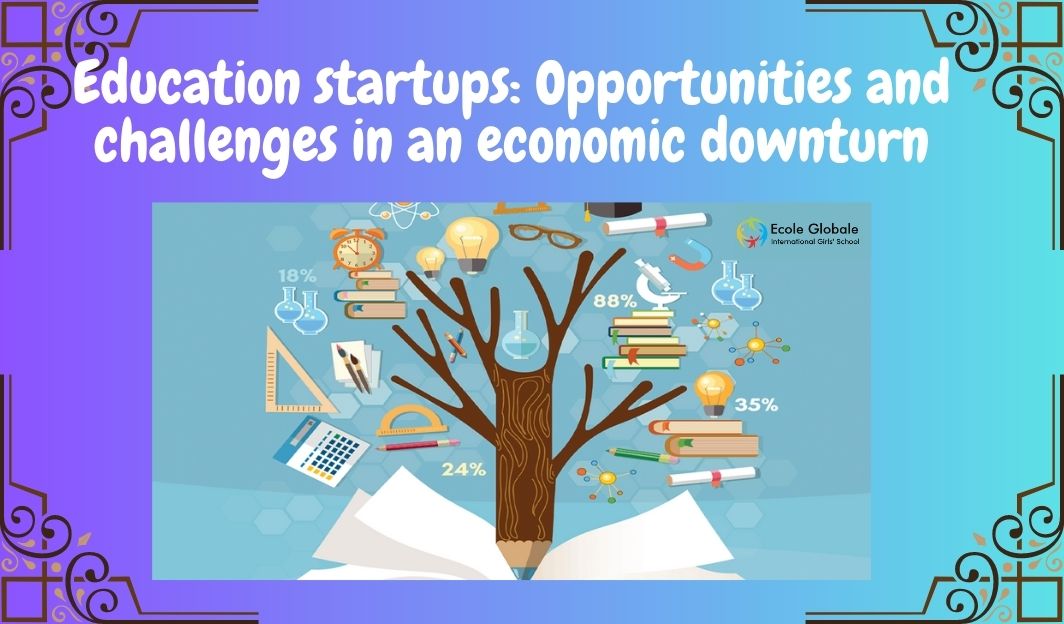Education startups can take advantage of this opportunity by offering high-quality courses that are tied to market trends and needs. The global economic recovery has been weak and uneven, but the signs are increasingly positive that we may be on the verge of stronger growth. In addition, educational institutions are facing challenges in an ever-changing world. Many do not offer enough flexibility and choice for students and parents who want to pursue higher education at all levels.
As a result, more than ever before, there is an increased demand for educational opportunities outside traditional institutions.
The current economic climate makes it harder for startups to raise funds and grow. But if you’re a startup, there are opportunities to be found in this downturn.
The current economic climate makes it harder for startups to raise funds and grow. But if you’re a startup, there are opportunities to be found in this downturn. The current economic climate is affecting the education startup sector. The funding gap has increased significantly and startups are finding it harder to get funding from investors.
The startup industry is a very dynamic one and there have been many changes in the recent past. However, the negative impact of the economic downturn on startups has been severe.
Importance of education startups

As per research conducted by the CBSE schools in India, Education is a lucrative business. It also happens to be one of the most important investments in a person’s life, with the right schooling often being the difference between a career as a successful entrepreneur or someone stuck working at a dead-end job. That’s why education startups are so attractive to investors — they can offer huge returns on investment and help kids get the skills they need to succeed. But these companies face many challenges, including government regulation and competition from established companies.
The education sector is one of the fastest-growing industries in the world. It is not surprising as education is a large industry with significant potential for growth. With an increasing demand for affordable higher education and increased interest in lifelong learning programs, there is no better time to invest in an educational startup.
Opportunities for education startups in an economic downturn
Increased demand for online education
The financial crisis has put a lot of pressure on the education industry. It has led to many educational institutes shutting down, resulting in job losses. However, with the rising trend of online learning, there is an increased demand for e-learning courses and platforms. It has opened up new opportunities for education startups looking to capitalize on this emerging market.
Education startups can take advantage of this opportunity by offering high-quality courses that are tied to market trends and needs. Many entrepreneurs have already started offering online courses in various niches such as coding, design, marketing, etc., which have been well received by students across the world.
Due to the increasing cost of higher education in developed countries such as the US, Europe, and Australia, many students from these nations are moving towards developing countries like India where they can get higher quality education at a low cost. As a result, many Indian universities have seen an increase in international students enrolling in their programs each year over the last decade or so.
-
Cost-cutting measures in traditional education
Many schools are cutting back on staff numbers due to budget constraints and this presents another opportunity for startups that can offer teachers and other staff members a new way of working without compromising the quality of teaching or learning outcomes.
-
Funding opportunities
Education startups present a unique opportunity to enter an industry that has been relatively untouched by technological disruption. As technology has made it easier for people to earn degrees online, the education market has grown exponentially.
The biggest challenge for education entrepreneurs is getting funding — and sometimes just finding investors is difficult enough. But in a downturn, there may be new opportunities to get funding.
Challenges for education startups in an economic downturn
-
Competition in the education market
According to the Best Schools in India, The education market is crowded. Many established players have been operating for decades and have established brands and reputations. They also have access to large amounts of capital and resources, which enables them to invest heavily in marketing campaigns and sales teams that help them attract new customers. It makes it difficult for new entrants to compete with these established players on price or quality alone.
There are also many new entrants into the market every year — including established companies that want to enter relevant educational fields but have no experience or interest in doing so, as well as new startups looking to disrupt traditional approaches by offering something completely different from what was available before. This further increases competition for existing players in the market, who already face plenty of pressure from competitors old and new.
-
Decreased consumer spending
The first and foremost challenge faced by startups is a funding gap. Investors are becoming more cautious when it comes to investing in new companies and hence they are not keen on providing funding to them. It has resulted in a significant fall in investment activity among investors and entrepreneurs since they need money to start their business or expand it further. The main reason behind this is that there are currently fewer opportunities available for investments due to weak macroeconomic conditions like low GDP growth, high unemployment rate, weak consumer demand, etc.
-
Limited resources and capacity
The current economic climate has affected the funding environment for education startups. Many investors are more risk-averse than they were before the recession, which means new businesses will find it harder to secure funding. Additionally, this downturn has led many people to tighten their belts in terms of spending on education and learning products and services, so there may be less demand for new products or services.
Strategies for education startups to succeed in an economic downturn
-
Focusing on a specific niche
The first thing for an education startup to do is to understand its market. It means researching your customers and understanding what they need from your product or service. Startups need to focus on a specific niche to target their audience better and provide them with better value. This strategy will help them reach more people with less effort than if they tried to cater to everyone. It is also easier for startups to scale when they specialize in a particular area.
-
Offering personalized and adaptive learning
It is one of the most important strategies education startups can use to succeed in an economic downturn. There has been a lot of discussion about how AI and technology will change education, but this is only one part of it. A more important aspect is how technology will make learning more personalized and adaptive for each student’s needs.
Today, many factors influence how learners learn — their age, cultural background, socioeconomic status, gender identity, etc. It makes it difficult for traditional schools to provide adequate support for all learners. But with personalized learning programs powered by AI technologies such as machine learning and natural language processing (NLP), educators can create unique learning experiences tailored specifically to each learner’s needs and interests.
-
Building strong partnerships
While the current economic downturn has been a challenge for many businesses, it has also created opportunities for others. The education industry is no exception.
As competition in the market has intensified, more education startups have emerged to meet new demands. And while this may seem like a good thing at first glance, it can create problems if you’re planning to start your own education business.
Building strong partnerships is one way to overcome these challenges and capitalize on opportunities in the education market.
Conclusion
The economic downturn presents some unique opportunities for startups. While many education technology companies may need to reevaluate some of their efforts, there are also plenty of opportunities for new ventures to come in and fill the funding gap.
For any queries related to parenting, schooling, or any student-related tips, click here to check out our latest blogs.









